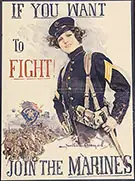Woodrow Wilson
WWI, also known as the Great War, had begun by staying regionally within Europe. Although this was a dark time in world history, it was also a time for great people to step up to make a difference.
One of the most influential and notable characters of WWI was President Woodrow Wilson.
Woodrow Wilson was born December 28, 1856 in Staunton, Virginia. Woodrow was a middle name as his first name was Thomas. Later into his life, he dropped the Thomas name and used only Woodrow. His father ministered in the Presbyterian faith and had a huge influence upon young Woodrow’s upbringing.


Later on the Wilson family relocated to Augusta, Georgia. This left a huge impression upon young Woodrow as it was where he first saw Union soldiers of the Civil War come marching through the town. During these years, his mother Janet tended to the wounded soldiers of the war at a local hospital.
The Reconstruction years of the South after the Civil War brought huge poverty to many of the South. This misery affected Woodrow immensely as his family would move twice more; to Columbia, South Carolina in 1870 and then to Wilmington, North Carolina in 1874.
Young Wilson learned considerable from his father, Reverend Joseph Wilson. The man was adamant that the South had been right to seek its separation from the North. He also instilled in Woodrow the importance of prayer and loving God. On the other hand, Woodrow’s mother was a soothing influence upon him and his siblings.

Woodrow Wilson attended college at the College of New Jersey in 1875 and graduated in 1879. He then attended Law School at University of Virginia, but dropped out his second year. Young Wilson then studied law by his own hand and set-up practice in Atlanta Georgia in 1882. When he became bored with law practice, Woodrow Wilson entered Johns Hopkins University where he studied political science and history. He earned his PH.D. in 1886.
Woodrow Wilson became President in 1912. He election was not considered an easy victory for Wilson however. The corruptive influences that were happening behind the scenes of Tammany Hall were a big factor in his successful win. Side deals were being made and threats of one group throwing their weight to another group affected the election. However, in the end Woodrow Wilson became America’s 28th President.

When WWI began in Europe in 1914, President Wilson wanted to keep America out of the actual conflict. He believed in the neutral status of the country from becoming involved in what was happening. However, he did see his involvement of the nation as a broker of peace. However, much was happening that would change America from staying out of the war.
Woodrow Wilson noticed much was happening on too many sides to keep America out of the battlefield in Europe. Germany was flexing its submarine muscle of sinking ships, the situation in Mexico with American troops in that country dealing with a revolutionary (Pancho Villa), the Russian Revolution threatening to remove its troops from the fight; all of these were weighing in on President Wilson.

In 1916 Wilson was reelected to the presidency. He was had become popular by many Americans for staying out of the war in Europe. But that position was soon to change because of everything happening around him.
In 1917, President Wilson asked Congress to agree to declaring war, ensuring America’s involvement in the fight. He addressed the nation with the decision to send troops to the war in Europe. This was also the first time a President had addressed the nation directly, which became known as the “State of the Nation”.
During the war, Wilson used the propaganda machine to drop leaflets on Germany. His message was one of peaceful negotiation and telling the German people that the Americans were not out on a revenge agenda to end the war. His methodology rang home with many people.

President Wilson still tried to collaborate a peaceful resolution. Bu November of 1918, the war came to an end. He proposed “14 Points” at the Paris Peace Conference. These points were later articulated by inclusion of the Versailles Peace Treaty. Although the US Congress did not ratify the treaty; President Wilson’s points played a major victory in the establishment of the “League of Nations”. The United States however did not join the league.
Points that made it into the Treaty of Versaille.
Point 4: Countries to reduce armaments and weapons
Point 5: Resolution of colonial claims
Point 7 and 8: Preservation of the sovereignty of Belgium and restoration to France’s territory
Point 14: Creation of the League of Nations
In 1920, President Woodrow Wilson won the Nobel Peace Prize. In 1924, the great President that always fought for peace passed away.



